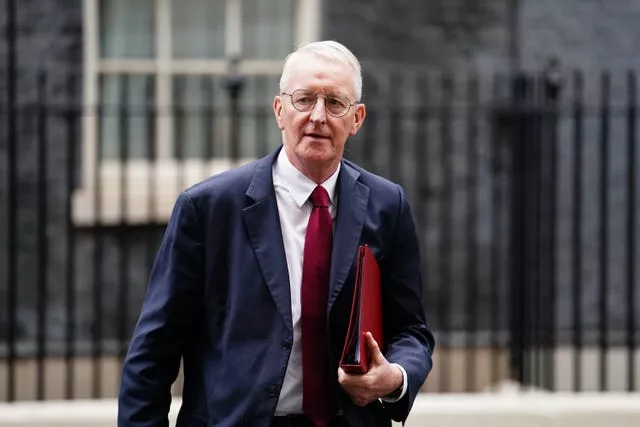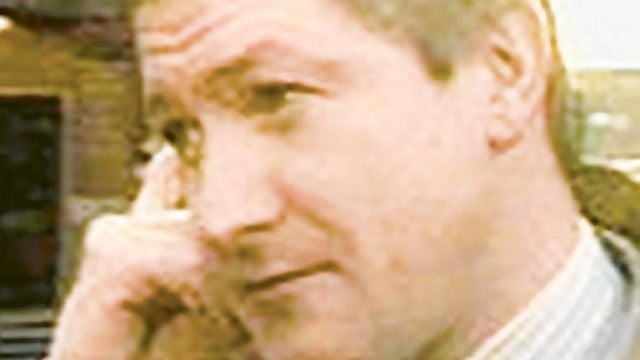The British government has ordered a public inquiry into the collusion-linked loyalist paramilitary murder of Belfast solicitor Pat Finucane in 1989.
Mr Finucane (39) was shot dead at his family home in north Belfast in February 1989 by the Ulster Defence Association in an attack found by a series of probes to have involved collusion with the state.
His widow Geraldine and the couple’s three children have been campaigning for decades for a public inquiry to establish the extent of security force involvement.
Northern Ireland Secretary Hilary Benn made the announcement to the UK House of Commons.
Mr Benn said it is a “plain fact” that a UK government commitment made more than 20 years ago to hold an inquiry into Mr Finucane’s murder “remains unfulfilled”.
“It is for this exceptional reason that I have decided to establish an independent inquiry into the death of Patrick Finucane under the 2005 Inquiries Act,” he said.
Today is for my father, Pat Finucane.
The announcement that there will now be a public inquiry into his murder is very much welcomed by our family.
Led by my mother Geraldine, we have campaigned for decades to uncover the truth behind my father’s murder.
I want to thank… pic.twitter.com/NWl3ikaSF6— John Finucane MP (@johnfinucane) September 11, 2024
Mr Finucane’s son John, a Sinn Féin MP for North Belfast, welcomed the announcement.
“Today is for my father, Pat Finucane,” he posted on X, formerly Twitter.
“The announcement that there will now be a public inquiry into his murder is very much welcomed by our family.
“Led by my mother Geraldine, we have campaigned for decades to uncover the truth behind my father’s murder. I want to thank every person who has supported our campaign throughout those years. Today belongs to us all.
“After 35 years of cover-ups, it is now time for truth.”
In 2019, the UK Supreme Court said all previous examinations of the death had not been compliant with human rights standards.
The court acknowledged Mrs Finucane had been given an “unequivocal undertaking” by the British government following the 2001 Weston Park Agreement that there would be a public inquiry into the murder.

However, the Supreme Court judges found that the UK government had been justified in later deciding against holding one.
The court said it was up to the British government to decide what form of investigation was now required.
The following year, the British government pushed back a decision on a public inquiry, insisting outstanding issues concerning the original police investigation needed to be first examined by the Police Ombudsman for Northern Ireland.
In the years since, Mrs Finucane has pursued further legal proceedings challenging the ongoing delays on a decision.
During the summer, the Court of Appeal in Belfast gave the British government a September deadline to confirm what form of human rights-compliant investigation it intends to undertake into the murder.
Mr Benn met members of the Finucane family in Belfast on Tuesday evening ahead of his announcement on Wednesday.
Taoiseach Simon Harris said the announcement of a public inquiry was part of a “new approach” by the UK government into legacy issues in the North.
Mr Harris said: “Today is a vindication of Geraldine Finucane and her family who have campaigned over decades for truth and justice. I spoke to John Finucane by phone yesterday evening to underline the enduring importance that I, as Taoiseach, and the Government attach to progress in his father’s case.
“This is the beginning of a process and it will be important that, as details are confirmed, there is confidence that it can meet the standards and independence thresholds essential to an inquiry of this nature. I want to acknowledge the leadership of Prime Minister Keir Starmer and Secretary of State Hilary Benn in coming to this decision.”
Mr Harris added: “Prime Minister Starmer and I have discussed the Pat Finucane case, including as recently as last Saturday when we met in Dublin, and in follow up to a previous discussion in Chequers in July.
“I know that the Prime Minister is committed to finding a new approach to legacy issues in Northern Ireland, and today’s decision by the British Government is in keeping with the spirit of that commitment.
“I have indicated to the Prime Minister that we stand ready to work with him and his Government on legacy issues.”
Former taoiseach Bertie Ahern also welcomed news of an inquiry into the murder of Mr Finucane.
The murder had been “a very sad case” and the truth needed to be found, he told RTÉ radio’s News at One.
Access to MI5 records would be crucial to any inquiry to get to the truth of what happened and allegations of collusion, he added.
He said it was not a secret that an RUC patrol at the estate where the Finucane family lived had been withdrawn, which allowed two paramilitaries to enter their home and shoot Mr Finucane 14 times in front of his wife and family.
“Every time I think we made progress, we got to the stage that the files and the records in MI5 would not be given.”
Mr Ahern said he believed there had been involvement by MI5.
“I can't prove that MI5 were part of this. But what we can prove is that when Judge Cory was doing his investigation, MI5 went into his office in London and took some of his hard drives.
“MI5 were all over this. So if it's an inquiry, it will have to, in the terms of reference, get cooperation from MI5, which is something we didn't get in the end in the Dublin Monaghan bombings. And so we'll see whether it comes out.”
There would be no point in having an inquiry unless MI5 participated “because their hands are all over this.
“It leads to very murky questions, not just allegations about the police, who was on whose payroll, where was the collusion and who were the people involved?”
Mr Ahern said that former British prime minister Tony Blair had wanted to help in the establishment of an inquiry, but he “couldn't get MI5 to play ball on this.”
If there is access to MI5 records it would be “ground-breaking”, he said.







